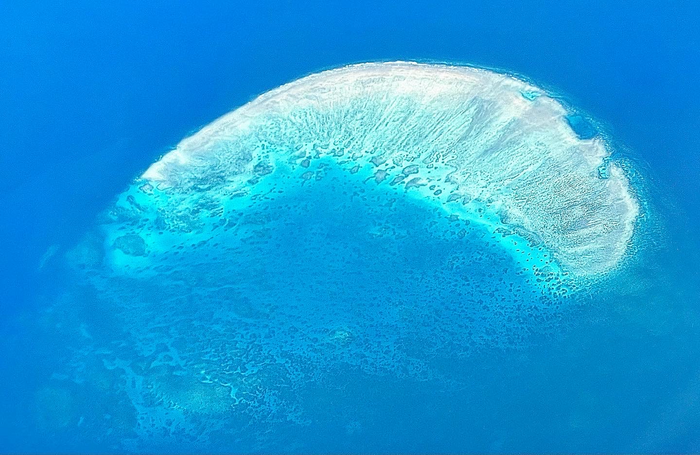Reviewed by Mila PereraSep 12 2022
According to a study published in the journal Earth’s Future, climate models are unreliable when predicting tropical storms' impact on delicate coral reefs.
 The image shows Feather Reef which is in the central part of the Great Barrier Reef that is frequently exposed to damaging waves from cyclones—with a 10% chance of exposure in any given year under the current climate. Image Credit: Dr Marji Puotinen.
The image shows Feather Reef which is in the central part of the Great Barrier Reef that is frequently exposed to damaging waves from cyclones—with a 10% chance of exposure in any given year under the current climate. Image Credit: Dr Marji Puotinen.
Conservationists are interested in using the models to determine which coral reef communities are the most susceptible to storm damage in light of the expectation that tropical cyclone intensity will increase with climate change.
This will allow them to focus their conservation and protection efforts on coral reefs less likely to be negatively impacted by climate change.
However, a group of scientists from the Australian Institute for Marine Science, the University of Leeds in the UK, and the Commonwealth Scientific and Industrial Research Organization (CISRO) are warning against using the climate models, claiming they are not yet reliable enough to predict which reefs will be most at risk from cyclone damage.
A cyclone is a moving weather system that produces stormy weather features such as intense rainfall, large waves, and strong circular winds. The most dangerous area surrounds the cyclone’s eye, with an average diameter of around 50 km.
Strong waves can destroy coral reefs, but powerful cyclones have the most devastating effects when they pass through reef ecosystems.
It can take decades to centuries for coral communities to recover from the damage that is caused by extreme weather events—and it is important that conservationists target their limited resources at those reefs which are more likely to survive climate change.
Dr. Marji Puotinen, Study Co-Author and Spatial and Ecological Data Scientist, Australian Institute of Marine Science
Dr. Puotinen added, “To do that, they need to assess the vulnerability of coral reefs in the face of more extreme weather patterns. But currently, we are urging caution when it comes to predicting the damage that could be done to a coral reef from future cyclones.”
The research team examined how well the climate models represented recent extreme weather events to evaluate the models’ accuracy. They discovered that the models did not adequately represent all the characteristics of cyclones that cause coral reef-damaging waves.
Climate models predicted a medium to high degree of certainty that the average cyclone will become more powerful on a global scale due to climate change. However, the models were less certain about how tropical cyclone wave damage would affect coral reefs.
For instance, even if the cyclone were stronger, it would be unlikely to track or move close to the coral reefs.
Our investigation has identified the pros and cons of using climate models in coral reef conservation work.
Adele Dixon, Study Lead and Doctoral Researcher, University of Leeds
Dixon further stated, “The models are accurate in projecting at a global scale that cyclones in the future are highly likely to be more intense because of climate change. But they are less accurate in projecting how those cyclones will affect individual coral reefs—that is the result of more localized conditions such as the pounding of waves.”
The experts call for more research to determine how climate change affects tropical cyclone characteristics that cause coral reef destruction.
Journal Reference:
Dixon, A. M., et al. (2022) Coral Reef Exposure to Damaging Tropical Cyclone Waves in a Warming Climate. Earth’s Future. doi:10.1029/2021EF002600.